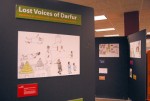Human rights activist speaks about Darfur

Students and activists lined the walls of the Library’s Grace Allen Room on Wednesday to hear former BBC journalist and human rights activist Rebecca Tinsley speak on the conflict in Darfur.
Tinsley’s lecture, “Genocide in Darfur: Lessons from Rwanda and Uganda,” was meant to raise awareness of the crisis in Sudan.
Tinsley, who is also the founder and director of Waging Peace, an organization that campaigns against genocide and human rights abuses, said she is humbled to represent the people of Darfur.
“I can honestly say it is the most interesting thing I have ever done in my negligible life,” she said. “I’m here to be a voice for the people in Darfur that I have met.”
Tinsley’s speech centered on her hope to inform people that the issue in Darfur is bigger than its portrayal by the media makes it seem.
She said she attributes the lack of media attention to what she calls “the sidebar syndrome” — when stories about issues like the conflict in Darfur are reduced to newspaper sidebars, while Britney Spears continues to make headlines.
“It’s a sign of our priorities,” Tinsley said.
Darfur, a region in western Sudan, has suffered more than 300,000 civilian deaths and had more than 2.5 million people left homeless since war broke out between the Sudanese government forces, Janjaweed militia and other rebel groups, Tinsley said. She also said 90 percent of the villages there have been destroyed.
“Please do not think genocide is something that happens (only) in Africa. It is a part of the human condition,” she said.
The lecture was the first in the University of South Florida’s Holocaust and Genocide Studies Center 2009 Lecture Series.
Tampa campus Library assistant director of communications Eileen Thornton said the Library is working on creating a collection for the Center that includes artifacts, petitions and videos that will be available online.
“Our job is to make it accessible to anyone who wants to see it and eventually put an end to genocide,” Thornton said.
In the lobby of the Library are copies of drawings of the conflict by children who escaped from it.
The International Criminal Court in the Netherlands accepted these pictures as evidence of the conflict, and will use them to incriminate those accused of war crimes.
The original drawings are among 500 that will be donated to the USF Libraries Holocaust and Genocide Studies Center after touring several countries.
Thornton said the center also plans to hire a genocide scholar and eventually wants to house its collection in a facility.
Jen Drenth, an environmental science and policy major and president of STAND: A Student Anti-Genocide Coalition, said she hopes the lecture will inspire those who attended to do more.
“We may have just had 80 people, but that’s 80 more people that are going to get involved,” Denth said.
Anne Larrivee, a library and information science graduate student, said the lecture was inspiring.
“It’s just really eye-opening,” Larrivee said. “It makes me want to educate others.”
STAND communications director and Ph.D. candidate in communication Sarah McGhee said the first step in taking action is being informed.
“I’m so glad the University is stepping up and taking (on) the issue of genocide,” McGhee said.
Those who want to help should get involved with on-campus coalitions such as STAND and write to their senators and President Obama, Tinsley said.
“Any consciousness raising that you can do is never a wasted effort,” she said.






